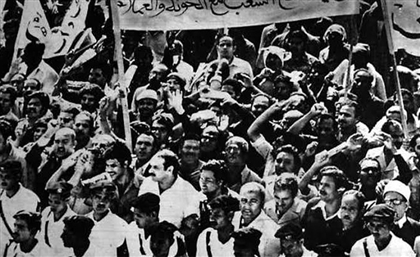Nael Shama Revisits Egypt Before Tahrir
Sina Stieding speaks with academic author Nael Shama about his latest release, 'Egypt Before Tahrir' to discuss the events leading up to the 2011 uprising and how, in many ways, not much has changed.

With an abundance of books out there talking about January 25th and its aftermath, the weeks, months and years just before the Egyptian revolution have often been neglected. Looking at the nature of Egypt’s politics, culture and society just before those fateful days at Tahrir Square in 2011, one may observe, however, that the state and the nation were in fact far from flawless, and that a revolution could have been anticipated. In his new book, Nael Shama PhD reminisces about the period just before President Mubarak’s ouster, and comes to terms how a collision of people and power was in fact “natural, perhaps even inevitable.” In an attempt to put the events of January 25th into a perspective for the future by looking at the events directly preceding it, Shama has created a read for everyone who wants to remind themselves that there was a life before the failed attempts to create the new Egypt.
Egypt Before Tahrir is a collection of Shama’s commentaries and essays he wrote before the revolution during his engagement at Daily News Egypt as a contributor between 2007 and 2011. Although not announcing an imminent revolution, the language of his works paints the picture of a discontent nation which is moving towards the desire for change, and the lessons to be learned from reminding ourselves about the past and the struggles we faced before are that maybe, nothing much has changed. “To many, what they will read will not sound too different from what they find in the streets today,” Shama says. Looking at the future, however, requires to make sense of the past and present. Egypt Before Tahrir has got the past covered so the present won’t forget.
When reading the stories of the last few years of Mubarak’s rule, Shama expects readers to realise that despite a revolution separating the chapters of the book from the reality in Egypt’s streets today, not much has in fact changed at all: “We have a centralised state, we have a President with sweeping powers, we have a bloated and inefficient bureaucracy, we have blatant corruption, we have weak and fragmented political parties, and we have a society that is characterised by conflict." For few, this description would not ring a bell; the Mubarak years were characterised by the same principles. The book paints the picture of a pre-revolutionised Egypt, yet it reads itself like a contemporary account of present day Masr. Therefore, Shama hopes for past, present and future generations to start thinking and realise that the revolution has not arrived in society yet, at least when looking at past accounts of it.
What was that revolution then? “Many are frustrated because they think their revolution has been stolen,” Shama tells us, because those autocratic characteristics and confused societies can still be found. He prefers calling it the Aborted Revolution; the offspring of the long revolutionary pregnancy has not been born yet but was abandoned before it came to life in full. Nevertheless, Shama refuses to look at the revolution as a failure. “The revolution has not failed because it has not yet occurred,” Shama quotes one of his favourite writers, and thoroughly agrees with rejecting the fact that we find the same politics, culture and society today as five years ago as an evidence for failure. “Maybe it’s going to take a while until we can see the change that we hoped for on January 25,” he says. “But in a few decades I am confident we will look back and look at the current time as the first wave of a successful process of change.” Tahrir was merely the beginning.
When talking about the revolution, Shama therefore chooses a different terminology: instead of calling it a failed, abandoned or successful revolution, Shama just refers to the events in January 2011 as “Tahrir." To him, the things he witnessed during his own tenure at the January 25 Tahrir gatherings are the Egypt he likes to remember. People smiling at each other, picking up rubbish and full of hope for a better future is the first phase of that revolution he hopes to one day see finished. Today, the memory of Tahrir sometimes fades away in the light of a society stricken by instability and a political system that has not been as reformed as many had hoped. Shama, however, wants to give the next few years time to heal itself, and maybe bring the fruits of the protestors’ labour to the country in a more unconventional way than expected.
Just focusing on either politics or culture and society didn’t seem right to Shama. “Our understanding of one is overlapping with our understanding of the other,” he says. In order to explain how January 25 could happen, one must look at both. The government doesn’t choose to start a revolution, he says, and the culture and society doesn’t get to set up new institutions and policies. To understand revolution, Egypt Before Tahrir therefore examines both and encourages discussion. “I’m hoping that people will read the book and start thinking,” he tells us. When doing that, they don’t have to agree with him. Shama merely hopes that his accounts will be accepted and that even non-academics, who his book is initially written for, will start thinking for themselves and engage with the topic.
“In Egypt, we lack the fundamentals of having a discussion,” Shama rightly identifies. Egyptians see things in black and white, and their ability to accept other opinions is very limited. Egypt Before Tahrir, however, is just an example. There are numerous ways to tell a story, and this one is Shama’s. He hopes that people are open to his story, and that it brings the same conclusion to readers as the revolution brought to him: the future is bright, and Tahrir was a “turning point”, even if we don’t see the signs of it manifested in our lives just yet. But Shama is sure that the generations to come will not lose the spirit of Tahrir, and will try to one day live in that country they dreamed of in January 2011, one way or another.
- Previous Article Egypt Court Rules Foreign Homosexuals to be Deported
- Next Article New Music: Novo - Rain
























